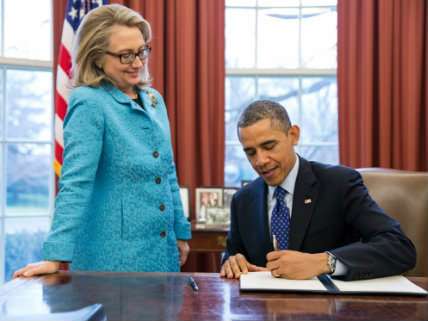Clinton Distances Herself From Obama (But Not Really)

The world of professional Clinton-watchers is abuzz this week thanks to an interview Hillary Clinton gave to The Atlantic's Jeffrey Goldberg. In the interview, which The New York Times describes as "remarkably blunt," Clinton, the former Secretary of State, takes a few first steps to distance herself from President Obama, saying things like, "Great nations need organizing principles, and 'Don't do stupid stuff' is not an organizing principle." Clinton also describes the Obama administration's inability to "build up a credible fighting force" of anti-Assad citizens in Syria as a "failure."
There are a handful of moderately sharp lines like that, but there's no real revelation. Mostly, the interview simply confirms of what has long been known, which is that Clinton is more hawkish than Obama, and that she'll be willing to say so to whatever extent she thinks it will help her politically. There aren't a lot of details, though. She's not defining her differences with Obama so much as acknowledging them.
And as a report in Politico this afternoon indicates, she also doesn't want too much distance between herself and the president. Clinton spokesperson Nick Merrill told Politico today that Clinton called President Obama regarding the interview, and that it's all just a friendly disagreement.
"Some are now choosing to hype those differences but they do not eclipse their broad agreement on most issues," Merrill said. "Like any two friends who have to deal with the public eye, she looks forward to hugging it out when she they see each other tomorrow night."
The early conventional wisdom, to the extent that it exists, is that Clinton is the clear favorite to win the presidency in 2016. But I think this incident suggests one of the troubles she's going to have, should she run and win the Democratic nomination, which seems all but certain.
She wants to suggest some differences between herself and Obama, but not with any clarity, and not in a way that creates any real distance between them. And she'll probably want to keep most of whatever differences she does reveal confined to the realm of foreign policy, partly because that's where her experience is, and partly because the Democratic base isn't likely to support major departures in domestic policy. Which means that unless there's some big, unexpected break coming, she'll essentially be running as a slightly more hawkish version of Obama. Inevitably, that means she'll be tied to Obama's less-than-popular presidency and controversial domestic agenda. Unless Obama's current approval ratings improve—which of course they could over the next two years—that's not great a place to be.


Show Comments (87)